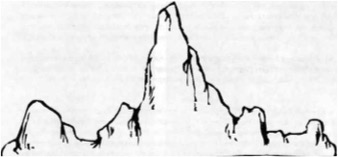The intimacy of practice is the practice of non-separation, of being at one with whatever is happening. We tend to think that we are not all right now—we’re too fearful, greedy, angry, whatever—and if we take up some spiritual practice we can improve ourselves. By doing this, we think, we will be all right at some moment in an imagined future. This is the mind that works on the “in order to” principle—we are always doing this in order to get that, or to be that. Yet this very tendency—to strive, be ambitious, set a goal, get ahead of ourselves—takes us out of the present moment, away from how we are right now. It actually prevents intimacy from this moment; our wish for intimacy prevents us from being intimate.
One of my favorite Buddhist traditions is the Soto Zen lineage of Kosho Uchiyama roshi. Uchiyama was the disciple of Sawaki-roshi, and their exchanges informed several of Uchiyama-roshi’s books. Sawaki, who had a difficult, orphaned childhood, practiced a very austere and “homeless” form of Zen. He was a powerful and charismatic teacher, while Uchiyama presents himself in his writing as being timid and weak. At one point as a young monk, Uchiyama says to Sawaki, “If I practice zazen for many years, will I be as strong as you?” Sawaki, without a moment’s hesitation, says, “No, you won’t. I’ve always been this way. Zazen didn’t do this for me.”
Sawaki was famous for saying that zazen was entirely useless. He said he wanted his epitaph to read, “Here lies Sawaki-roshi. Wasted his whole life sitting on a cushion.” (But if you don’t wholeheartedly do this useless activity, he would say, your whole life will be useless.) Sawaki was trying to counteract the “in order to” mind, and insisted that his students sit just for the sitting. Practice Dharma for the sake of Dharma, and not something else. He was in the tradition of the great teacher Eihei Dogen, who made the puzzling statement that it is not practice that leads to enlightenment, but that correct practice is enlightenment–wholehearted sitting is already an expression of the awakened mind. Dogen even invented a compound word for this concept, and referred to it in his writings as practice-enlightenment. He wanted his students to sit and know they were enlightened.

On the one hand, sitting is one of the most practical things you can do. It definitely has beneficial physical and psychological effects, as anyone will tell you who does it (though it is not always easy to define those benefits). But when you sit in order to gain something—the way Uchiyama wanted to be like Sawaki—you are undermining yourself. You limit what sitting can do for you.
So, after you have learned how to calm and stabilize the mind, simply be as you are. You may find that your willingness to be nakedly face this moment exactly as it brings with it an extraordinary fulfillment, a fulfillment that is independent of the actual content of the moment. Over time, the mind will hanker less after notions of a better future.
In the words of Ajaan Chah, the great Theravada teacher, “Don’t try to get anywhere in practice. The very desire to be free or to be enlightened will be the desire that prevents your freedom. You can try as hard as you wish, practice ardently night and day, but if you still have the desire to achieve you will never find peace….simply let go. Watch the mind and body mindfully, but don’t try to achieve anything.”
Excerpted from a talk given by Larry Rosenberg at CIMC.